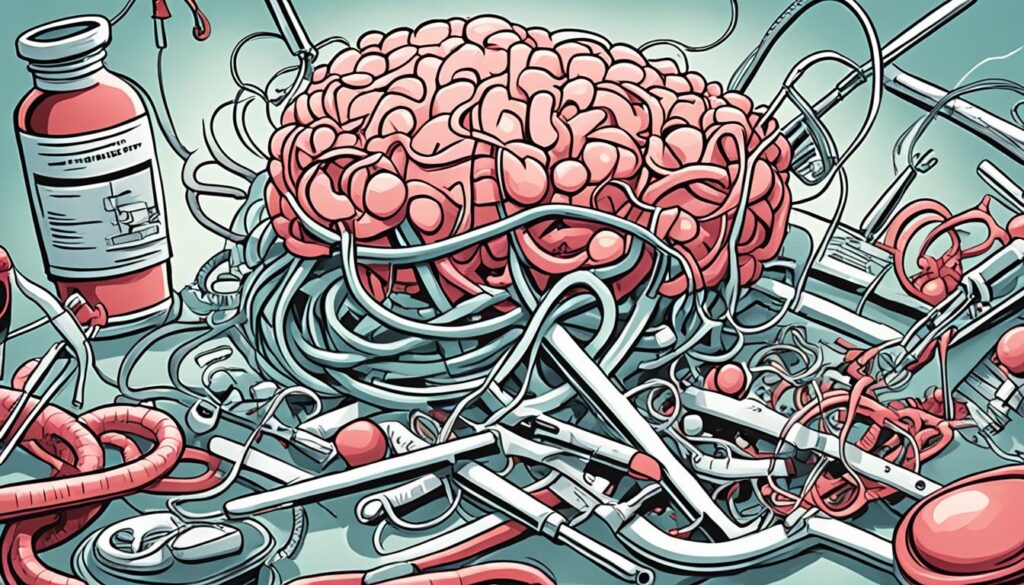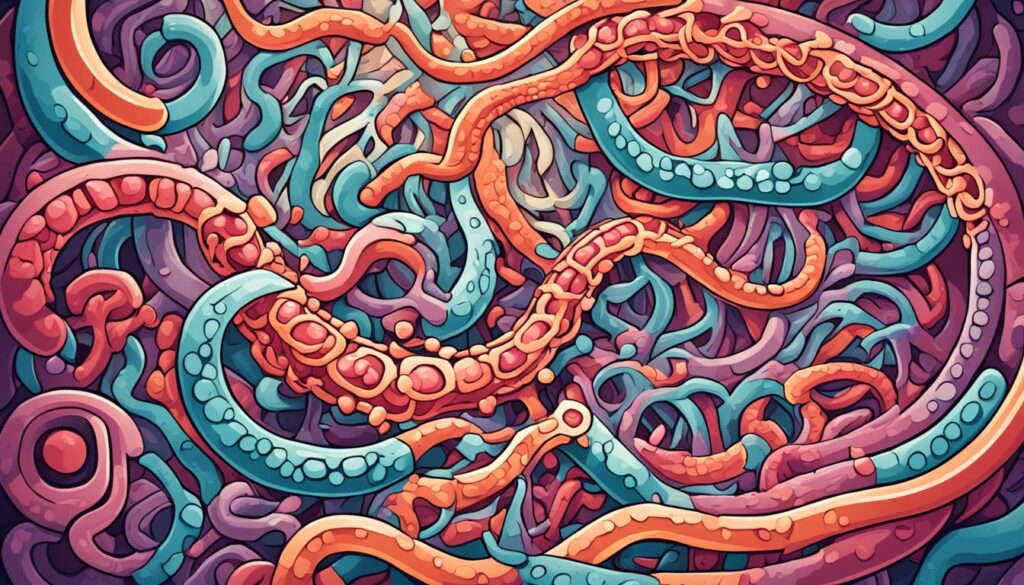Intestinal obstruction makes it hard for food or liquid to move through your gut. This blockage can happen in the small or large intestine. Knowing the reasons behind it is key to dealing with this issue.
Table of Contents
ToggleAmong grown-ups, things like scarring in the gut, hernias, and colon tumors are often the cause. Kids commonly get a blockage when one part of their gut slides into another. There are also other reasons for a blocked intestine, such as Crohn’s disease and a twisted gut.
If not treated fast, a gut obstruction can get really bad. Tissue can die, and you might get really sick from an infection in your belly. So, it’s vital to see a doctor right away if you think this might be happening to you.
Overview of Small Bowel Obstruction
A small bowel obstruction is when food or liquid can’t flow through the small intestine. This blockage is serious, as it stops the normal movement of your digestive system. It can cause big health problems like tissue damage and severe infections if not treated quickly.
Definition and Significance
About 300,000 Americans get a small bowel obstruction each year. This is a common type of obstruction. Fast treatment is key because it can become life-threatening if ignored.
Role of Small Intestine and Colon
Your small intestine and colon work together to process food and remove waste. A blockage in the small intestine stops the flow. This can lead to serious health issues if not fixed soon.
Importance of Prompt Medical Care
It’s vital to see a doctor right away if you suspect a small bowel obstruction. Without treatment, it can cause tissue death and an infection called peritonitis, which can be deadly. Early surgery, within the first day or so, has much better results. Your quick action can greatly improve your chance of recovery.
Symptoms of Small Bowel Obstruction
If you feel a variety of symptoms such as crampy abdominal pain, it might be a small bowel obstruction. The most common signs are: loss of appetite, constipation, vomiting, and not being able to pass gas or have a bowel movement. Also, you might notice your abdomen getting swollen.
The pain location depends on the blockage’s position in the small intestine. If you have signs of a small bowel obstruction, seek medical help fast. This problem can become life-threatening if you don’t get treated quickly.
Make sure you tell your doctor about your symptoms right away. Getting diagnosed and treated early is key for avoiding serious issues.
Causes of Small Bowel Obstruction
It’s key to know the causes of small bowel obstruction for quick and effective care. For adults, key causes include intestinal adhesions, hernias, and colon cancer. Yet, children often deal with a condition called intussusception.
Intestinal Adhesions
After surgery, bands of fibrous tissue sometimes form in the abdomen called intestinal adhesions. They top the list of reasons for small bowel obstruction in adults. These adhesions can twist or trap the intestines, causing a blockage.
Hernias
Hernias, when the intestine bulges into the body where it shouldn’t, can lead to small bowel obstruction too. This bulging blocks proper food and waste movement.
Colon Cancer
For small bowel obstruction, colon cancer is also a significant factor. Tumors from colon cancer may block the bowels’ path. Catching and treating colon cancer early is essential to avoid this issue.
Intussusception in Children
Children often face small bowel obstruction due to intussusception. This is when one part of the intestine folds into another. This folding can block the bowel and needs quick medical care.

Other Potential Causes
Intestinal adhesions, hernias, and colon cancer cause small bowel obstructions in adults. Besides these, you should also know about other possible reasons. Issues like Crohn’s disease, diverticulitis, twisted colon (volvulus), and impacted feces can block the small intestine.
Inflammatory Bowel Diseases
Crohn’s disease creates ongoing inflammation in your gut. This can make the small intestine get narrow in some places. When it narrows, digestion can’t flow through, causing a small bowel obstruction.
Diverticulitis
Diverticulitis is inflammation in the small pouches of your gut. Sometimes, these inflamed pouches stop food and waste from passing normally, causing a blockage in the small bowel.
Volvulus (Twisted Colon)
With a volvulus, your colon twists or loops, making it hard for waste to move normally. This twist can squeeze the small intestine and lead to a blockage there.
Impacted Feces
Hardened stool due to severe constipation can also cause a blockage in the small intestine. This problem is more likely in older adults or people with certain health issues or who take specific medications.

Intestinal Pseudo-Obstruction
Intestinal pseudo-obstruction, or paralytic ileus, is a rare condition. It acts like a small bowel obstruction but without an actual blockage. The problem lies in the muscles or nerves of the digestive system. This stops food and fluids from moving normally through the intestines.
Causes of Paralytic Ileus
Several things can lead to paralytic ileus. They include:
- Abdominal or pelvic surgery
- Infections, like pneumonia or urinary tract infections
- Some medications, such as narcotic pain relievers and antidepressants
- Conditions affecting muscles and nerves, like Parkinson’s disease
Intestinal pseudo-obstruction and paralytic ileus don’t mean there’s a physical blockage in the small intestine. But, they can still cause serious issues if not treated. Getting medical help quickly is very important. It can help avoid bad outcomes.

Risk Factors for Small Bowel Obstruction
Some diseases and conditions can up your chances of getting a small bowel obstruction. If you’ve had surgery in your belly or pelvic area before, you might develop adhesions. These are bands of tissue that form and can block your intestines.
If you have Crohn’s disease, your risk goes up too. Crohn’s is a type of inflammatory bowel disease that can make your intestines narrow. This makes blockages more likely. Abdominal cancers, including colon cancer, can also cause physical blockages and lead to a small bowel obstruction.
As you get older, your risk of small bowel obstruction increases. These risks are higher if you’ve had many surgeries before. Know these risk factors for small bowel obstruction, and talk to your doctor if you have stomach or bowel disease history.

Complications of Untreated Obstruction
Not treating a small bowel obstruction can be very dangerous. It may cut off blood to the intestine, causing tissue death. This can lead to a tear in the intestinal wall. Bacteria and toxins can then leak into the abdomen.
Tissue Death
The lack of blood flow can make a part of the intestine’s tissue die. This is called necrosis. It makes the intestinal wall weaker and more likely to tear. If it tears, the intestine’s contents can leak into the abdomen, causing a serious infection.
Infection and Peritonitis
When the intestine ruptures, it’s a medical emergency. This can lead to a severe infection called peritonitis. It’s when the abdominal cavity’s lining becomes inflamed. Peritonitis can quickly spread through the body. Immediate medical attention is crucial to stop sepsis and organ damage.
If you have severe abdominal pain, vomiting, or constipation, see a doctor right away. These symptoms may mean you have a bowel obstruction. Waiting to get help can lead to serious problems like tissue death and infection. Quick treatment is the best way to avoid these dangers.
causes of small bowel obstruction in Athletes
Small bowel obstructions (SBOs) are not common in young athletes but can occur. A special case shows how an athlete’s life and work can lead to this problem. This happened to a female professional basketball player.
Unique Presentation in Professional Athletes
A female basketball player in her mid-20s suddenly had SBO symptoms. She had pain in her stomach, threw up, and couldn’t pass gas or use the bathroom. She didn’t have any usual SBO risk factors like past surgeries. Her active job and lots of travel might have caused her obstruction.
Role of Exercise and Air Travel
Pro athletes, including basketball players, often have stomach issues while exercising or after. Up to 93% of them face this. The hard workouts can slow down blood flow to the bowels a lot. This might affect how the intestines work. Long flights add to this problem, possibly changing how the gut moves and leading to SBO.
Conservative Management and Return to Play
In her treatment, the athlete had a tube to relieve her bowels and was watched closely. She was back to full play in just five days with no problems coming back. This story shows how an athlete’s life can lead to and treat an SBO quickly. It also highlights how different their cases can be.
Diagnosis and Treatment Options
Diagnosing a small bowel obstruction usually requires imaging tests like X-rays or CT scans. These show the blockage’s location and causes, like hernias or cancer.
Imaging Techniques
X-rays are a first step in finding a small bowel obstruction. They might reveal dilated small intestines or air-fluid levels. But, they might miss the problem, needing more tests.
CT scans are often done next. They offer better views of the blockage and any related issues, like bowel damage.
Conservative Treatment Approach
The first line of treatment is often conservative. It aims to clear the obstruction and ease symptoms. Doctors start with IV fluids, a tube to drain the gut, and medications for pain or nausea.
For some, they might suggest eating less fiber or nothing by mouth for a bit. This can help the gut heal itself. Yet, if things don’t get better or if it’s an emergency, surgery might be needed.
Surgical Intervention
Some blockages don’t get better with simple treatments. If surgery becomes necessary, its aim is to remove the blockage and avoid further harm.
The surgery might involve cutting out a damaged part of the bowel. Or, it could be about fixing the issue, like removing scar tissue or placing a stent to open the gut up.
Getting surgery soon after diagnosis, within a day or so, is key to a better recovery. Waiting too long can make things much riskier.
Prevention and Risk Reduction
Some risk factors for small bowel obstruction, like past surgeries, are beyond our control. But, you can lower your risk by making certain choices. These include lifestyle changes and getting regular screenings. These steps help keep your digestion on track and spot any issues early.
Lifestyle Modifications
Eating well and staying active are key to avoiding bowel issues. A diet full of fiber keeps your gut healthy. Meanwhile, exercise helps prevent diseases that can cause blockages, like Crohn’s disease.
Regular Screenings
Getting regular checkups is important. These monitor problems like Crohn’s disease and colon cancer, checking for narrow passages. This way, if any signs show up, you and your doctor can act fast. This keeps small bowel obstructions at bay.
Conclusion
Small bowel obstruction is a serious medical issue. It needs quick diagnosis and treatment. This is to avoid dangerous problems.
Knowing the causes of this condition is key. Causes can be intestinal adhesions, hernias, and colon cancer. Identifying these helps in proper treatment. Some risk factors are out of our control. Yet, keeping your gut healthy and getting regular check-ups lowers the risk of small bowel obstruction.
If you notice signs of an obstruction, like strong stomach pains or vomiting, see a doctor right away. It’s your best shot at a good recovery. Understanding the signs and reasons behind small bowel obstruction is vital. This knowledge helps you to protect your health.
Dealing with small bowel obstruction needs careful steps. Stay up-to-date, live a healthy life, and see a doctor fast if anything seems wrong. These actions can make a big difference in how you manage this condition.
FAQ
What is a small bowel obstruction?
It’s a blockage in the small intestine. Food and liquid can’t pass through. If ignored, it can cause serious issues.
What are the common symptoms of a small bowel obstruction?
You might feel crampy pain in your belly. You could also have no interest in eating, constipation, or vomit. It’s hard to go to the bathroom, and your belly might swell.
What are the most common causes of small bowel obstruction in adults?
Adults usually get it from adhesions, hernias, and sometimes colon cancer.
What is the most common cause of small bowel obstruction in children?
In kids, it’s mostly intussusception. This happens when one part of the intestine slides into another part.
What other conditions can lead to a small bowel obstruction?
There are several possible causes. These include Crohn’s, diverticulitis, and even a twisted colon.
What is intestinal pseudo-obstruction, and how does it differ from a physical blockage?
Intestinal pseudo-obstruction mimics a blockage but isn’t physical. Nerve or muscle issues stop food from moving normally.
What are some risk factors for developing a small bowel obstruction?
If you’ve had stomach surgeries, have Crohn’s, or abdominal cancer, you may be at higher risk.
What are the potential complications of an untreated small bowel obstruction?
Without care, it can be life-threatening. The intestine’s wall could tear, die, or perforate, leading to peritonitis.
How is a small bowel obstruction diagnosed?
Doctors often use X-rays, CT scans, or other scans to diagnose it.
What are the typical treatment approaches for a small bowel obstruction?
At first, they’ll try non-surgical methods. This includes fluids and a tube to help with gas. But for some, surgery is needed.
How can individuals help reduce their risk of developing a small bowel obstruction?
Eating healthy, staying active, and getting regular checks can lower your risk.
About The Author

Medically reviewed by Dr. Nivedita Pandey, MD, DM (Gastroenterology)
Senior Gastroenterologist & Hepatologist
Dr. Nivedita Pandey is a U.S.-trained gastroenterologist and hepatologist with extensive experience in diagnosing and treating liver diseases and gastrointestinal disorders. She specializes in liver enzyme abnormalities, fatty liver disease, hepatitis, cirrhosis, and digestive health.
All content is reviewed for medical accuracy and aligned with current clinical guidelines.
About Author | Instagram | Linkedin




